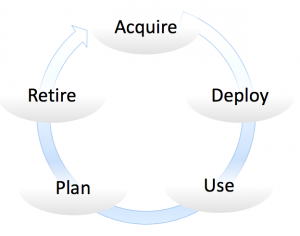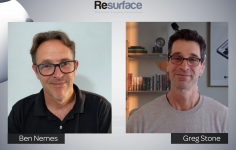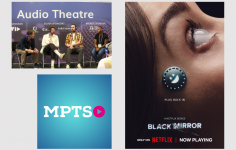When is the right time to retire a console?
In most studio scenarios, the console is the largest individual equipment asset, typically paid for over a number of years. Unless you’re new to all this, chances are this isn’t your first foray into buying – and then replacing – that major purchase in the middle of your room(s).
Consciously or unconsciously, Asset Management has played a part in running your business. Just as it would in any other, with any other type of capital asset.
If you have a friend who is an I.T. manager, then congratulations (sort of). Ask them about asset life cycle management, for them it’s a day-to-day fundamental.
Every asset has a lifecycle and the key to effective asset management is being across where a particular asset is in that process; knowing its value (to you and to others), and having a plan.
Asset lifecycle management is well served by theory, white papers, research and dull powerpoint diagrams like this one:

Here we dig into the main tenets as they relate to our businesses.
The three main factors at work
- Wringing the most out of the investment (sweat the big stuff)
- Dynamics of resale value in the secondary market over time
- Hidden cost of ageing kit
Looking at each of these in detail:
1) Wringing the most out of the investment (Deploy -> Use)
Once the kit has been paid off and/or depreciated, it begins to earn like never before. It would seem to make sense, and there’s an obvious temptation, to ride that wave indefinitely. So what are the factors telling us otherwise?
2) Diminishing value over time (Plan)
If you have a friend who is a bass player, then congratulations (sort of). Ask them about timing. If you accept that, inevitably, the console will one day be sold and replaced – and this isn’t always the case – then the question isn’t whether but when to sell it. Consoles are not real estate or Château Lafite Rothschild. Their value decreases over time, meaning that console will almost always be worth less tomorrow than it is today. Here, planning is everything.
If you need that asset to make a contribution to its own replacement, then when is that contribution biggest and what milestones exist which might have an impact? Consider Final Sale Date and End of Support, new model availability and time-limited part exchange offers. Of course, none of these factors apply uniquely to the current owner. As much as they drive the desire to sell (supply) they will also have an impact on desirability (demand).
3) Hidden cost of ageing kit (Plan – Retire)
The most obvious and most common reason for retiring or replacing a console is that something better has come along. Something more efficient and/or effective for the work, which itself will change over time. You and your clients need the latest tools and techniques to get to the outcome as efficiently and effectively as possible. Asset Lifecycle Management in its purest form.
Second on that list is hidden cost. Does that piece of kit represent an increasing cost (maintenance, high power consumption) or a business risk (downtime)? Does it prevent you from making much-needed technology improvements and savings elsewhere in the business (compatibility)? Has it been fully depreciated and therefore offers you nothing more in the way of tax relief?
The case for keeping and doubling-down: business continuity
Of course, there’s a scenario in which a piece of technology is bought and paid for, and worth more to the owner for the additional workload it services than a sale could ever contribute. Especially when the cost of re-fitting a room is taken into consideration. At some point, though, it will need maintenance and spares.
Some of the demand for used equipment comes from precisely this scenario. Where a business is reliant on a piece of “legacy” technology, there’s a critical need for ongoing supply of (increasingly scarce) spares, often in the form of a ‘donor’ desk.
Generally, creative businesses fall into one of three categories. Either they’re totally across this stuff in a very deliberate way, they’re focussed on it only when it matters, or not at all.
Our advice, if you’re not already, is to keep it in mind. Understand what type of console owner you are, assess whether that’s best for your business and customers. Talk to us, keep an eye on Resurface listings to guide your course of action, and then act.




